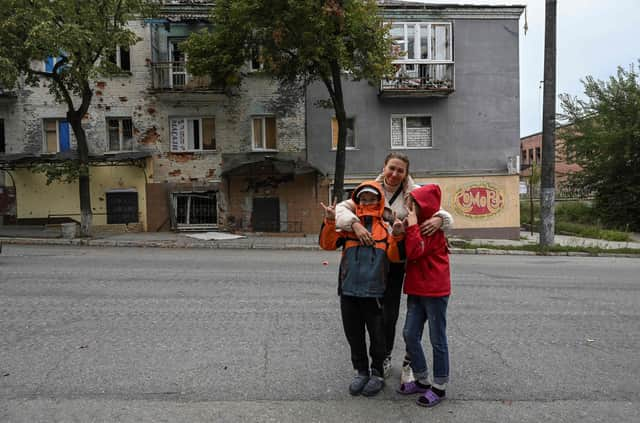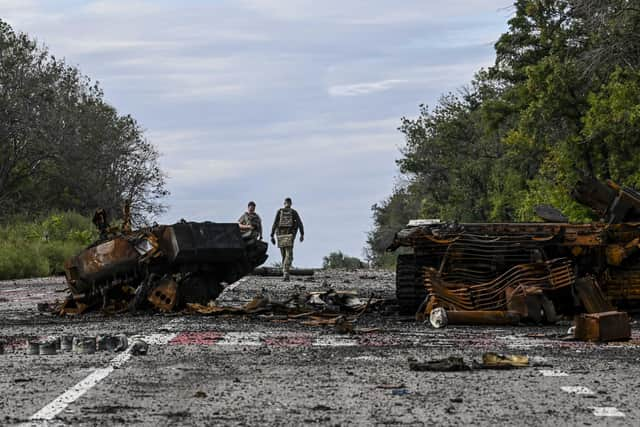Ukraine's fightback against Russian invaders has created a window of opportunity to fundamentally change the course of the war – Dmytro Natalukha MP


It had been awaited for more than five months and many experts had started to question whether Ukraine could conduct such large-scale operations.
As early as the beginning of September, however, the Ukrainian army proved itself capable not only in defence, but on the offensive as well, advancing simultaneously in Kherson in the south and the north-eastern Kharkiv region and crushing the Russian defence lines.
Advertisement
Hide AdAdvertisement
Hide AdNow, according to the Institute for the Study of War, Ukraine has liberated more territory in a matter of days than the Russians have been able to capture since April.
Ukraine’s General Staff keeps a strategic silence, but according to various estimates the Ukrainians have retaken up to 8,000 square kilometres of their land. If this is not the tipping point of the entire war, we are now closer to it than ever.
To understand the significance of the moment, it is necessary to answer the question: what are both sides fighting for?
For Ukrainians the answer is rather straightforward. This is literally a war for independence. Russia is clearly waging a colonial war, with no clear casus belli, except for a territorial claim to a nation they don’t recognise as sovereign.
Thus, for Ukrainians, this is a struggle for the right of self-determination and for rights and freedoms in the broadest sense – to choose their own government, to speak their own language and promote their own culture.


However, what are the Russians fighting for? While the average Ukrainian can easily explain his motives for going to the front, for the Russians their motivation is not so clear.
The necessity of this war for Russia has been totally shaped by state propaganda. There are fake narratives about defending the people of Donbas, a region that Russia was partially able to seize in 2014-2015 using its proxy troops; the existence of a Nazi regime in Ukraine; or the protection of the Russian-speaking population.
If the Ukrainians lose this war, it will affect everything. It’s not just about losing the state, it’s about disappearing as a nation – being denied our culture, history and self-governance, forced to either emigrate or submit and ‘Russian-ise’.
Advertisement
Hide AdAdvertisement
Hide AdFor the Russians, however, state propaganda has never affected their daily routine. The present and the future of a regular Russian never depended on either the fate of the Donbas, the activity of a supposed ‘Nazi’ regime in Kyiv or the alleged hardships of the Russian-speaking population of Ukraine. Neither Russians’ financial, social, nor cultural status was ever influenced by all of this.
Had Russian propaganda not been stirring up hysteria on the eve of the invasion, it is unlikely anyone in Russia would be concerned about these issues at all.
Take the Donbas which, according to propaganda, had been under brutal bombardment for eight years. Yet most Russians did not care until the war began. In fact, if tomorrow Russian state media announced that all these issues were settled, the population would just believe it.
Hence, Russians' motivation in this war always boiled down to two general points.
First, was to maintain the image of a great state, capable of solving any task set for itself by force.
For eight consecutive years, propaganda persuaded people that the existence of Ukraine was down to nothing but Russia’s goodwill and that, in the case of war, the Russian army would seize Kyiv in a matter of days. In presenting Russia as a superpower, the Kremlin smartly played on feelings of national pride and greatness, which no one dared to question.
But the war in Ukraine has shifted the balance. The myth of the invincibility of the Russian army was shattered near Kyiv. Then, at Chernihiv and Sumy, Russia was similarly defeated.
Now, in the trenches near Izyum and Kherson, the last bastion of the ideology that imbued the Russians with confidence of victory is crumbling. It is becoming increasingly difficult for Moscow to prove to its citizens that the objectives of the war, which do not directly affect them, are justified and worth the human cost. Russia's image as a strong state is challenged every time the Ukrainian military retakes another village or city.
Advertisement
Hide AdAdvertisement
Hide AdThis leaves Russians with their second motivation for war in Ukraine – financial. For inhabitants of Russia's hinterland, deprived of basic comforts, serving in the Russian army is one of the main sources of money.
However, it pales in comparison to the tangible losses of Russian lives on the front. It is already becoming increasingly difficult for the army leadership to recruit soldiers.
For example, among the prisoners near Izyum was a sailor from the Baltic Fleet, who underwent retraining in a week and was sent to the most dangerous section of the front.
Such situations create a vacuum in the mind of ordinary Russian soldiers. Faced with a reality different from the propaganda that has infused them, they lose all fighting spirit. This is one reason for the huge number of desertions near Kharkov and the increasing numbers of prisoners of war being taken near Kherson.
And in this situation, Russian soldiers have no one to blame but their own leadership. Even if the enemy, in their minds, is evil incarnate, the incompetence of Russia’s military leadership and the lies of their political rulers become evident.
Thus, Ukraine currently has a window of opportunity to fundamentally change the course of the war. In four to five weeks, the weather conditions in Ukraine will change significantly and the front lines, on both sides, will come to a standstill.
Until then, Ukraine can take full advantage of the chance, in the face of total panic and disorganisation among the Russian forces, to reclaim as much of its land as possible and possibly tilt the balance, not only on the battlefield, but in the Kremlin as well.
Dmytro Natalukha is a Ukrainian MP in Volodymyr Zelenskyy’s Servant of the People party
Comments
Want to join the conversation? Please or to comment on this article.
